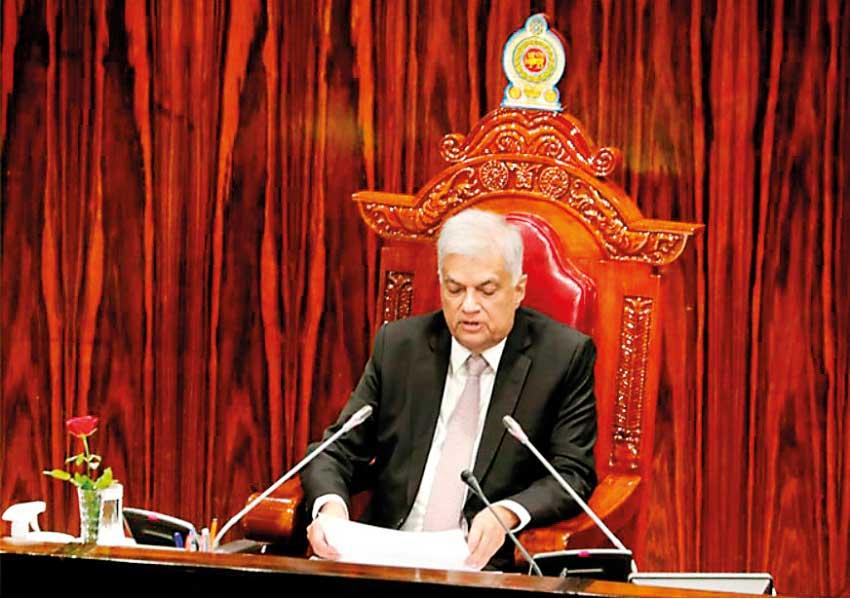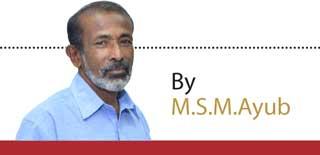06 Aug 2022 - {{hitsCtrl.values.hits}}

president Wickremesinghe delivering his maiden policy statement
(pic courtesy Parliament)
 The policy statement delivered by President Ranil Wickremesinghe in Parliament on Wednesday was far ahead of the similar statements made by his predecessor Gotabaya Rajapaksa in progressiveness and inclusiveness. He had prepared his speech very carefully not to create resentment in any group, political party or community, except sometimes for the Sri Lanka Podujana Peramuna (SLPP), the party that voted him into power.
The policy statement delivered by President Ranil Wickremesinghe in Parliament on Wednesday was far ahead of the similar statements made by his predecessor Gotabaya Rajapaksa in progressiveness and inclusiveness. He had prepared his speech very carefully not to create resentment in any group, political party or community, except sometimes for the Sri Lanka Podujana Peramuna (SLPP), the party that voted him into power.
Gotabaya Rajapaksa kicked off his speeches during important events recalling that he was elected by the Sinhalese Buddhists electorate or included that fact somewhere in the speech thereby psychologically distancing the other communities. However, Wickremesinghe while recalling that he was elected by the Parliament said “This House represents various communities of Sri Lanka. Whether you are Sinhalese, Tamils, Muslims, Burghers, or any other ethnic group, you are gathering here as the Parliament of Sri Lanka.”
President Wickremesinghe outlined his plan for the economic development of the country in several places in his statement. Concerning the immediate action that has to be taken he said “As a preliminary step, we initiated negotiations with the International Monetary Fund (IMF) on a four year programme. We would continue those discussions from this month. It is our expectation to conclude the staff level negotiations expeditiously and successfully. “The finalization of the debt restructuring plan has commenced in collaboration with Lazard and Clifford Chance, who are international financial and legal experts. We would submit this plan to the IMF in the near future, and negotiate with the countries that had provided loan assistance. Subsequently negotiations with private creditors would also begin to arrive at a consensus.”
Then he explained the basis for his policy to achieve his economic dreams. “If our country continues to nurture state-owned loss-making enterprises, the country will take a further downturn. Therefore, we have to make policy decisions on getting rid of such enterprises.
“However, I am of the view that, before the end of the 21st century, the Indo-Pacific Region will be the most powerful economic domain in the world. In this context, the strategic geographical location of our country is extremely important. We should make best use of this favorable position. Bearing this in mind, our future corporate laws and policies should be formulated.”
Finally he laid out his long term target the achievement of which is too far for his generation to see. “We are preparing a National Economic Policy for the next 25 years. It lays the foundation for a social market economic system, securing development for the poor and underprivileged groups and encouraging small and medium entrepreneurs.
“Our aim is to create a surplus in the primary budget by the year 2025. Our effort is to raise the economic growth rate to a stable stage, in order to establish a solid economic foundation by the year 2026. Currently, public debt is 140 percent of Gross Domestic Product (GDP). Our plan is to bring this down to less than 100% by the year 2032.
“If we build the country, the nation and the economy through a national economic policy, we would be able to become a fully developed country by the year 2048, when we celebrate the 100 th anniversary of independence.” Whether it was a plan or the prayer or the dream, making Sri Lanka a developed country at the dawn of the century of Independence of the country had been included in the speech he delivered at the 75th anniversary of his party, the United National Party (UNP) as well on September 5, last year.
However, these seem to be his expectations or long term promises and not a programme with a viable roadmap so long as he did not explain it with detailed strategies. For example, he has to explain how he is going to bring the public debt down to 100 percent of GDP from the current 140 percent by the year 2032. Even the World Bank had said on July 28 that it did not plan to offer new financing to Sri Lanka until an adequate macroeconomic policy
framework is in place.
In fact, this is a repetition of a similar statement by the Bank issued on May 24. Past governments always failed in translating conceptual frameworks which had been very attractive into specific projects on the ground. The proof of the pudding is in the eating, they say.
Parliamentarians of almost all political parties, except for those from the Janataha Vimukthi Peramuna (JVP) commended his speech on its conclusion. However, the SLPP, the party that voted him into power also seems to be not happy about some of his remarks. It was evident by the apparent uncomfortable reaction by the party leader Mahinda Rajapaksa, who paved the way for Wickremesinghe’s ascension by way of an attack on the protesters on May 9, when journalists approached him for his comments.The President during his speech referred to the artificial control of the rupee and the termination of the Light Rail Transit (LRT) project by the Gotabaya Rajapaksa government as a reason for the current foreign exchange crisis. He also stated that the law will be applied equally to the people who attacked the peaceful protesters on May 9. He recalled the objections by the leaders of the SLPP against the ‘Suwasariya’ ambulance service during the Yahapalana government and stated that the President of a country does not have to be a King or a God, which many might see an insinuation aimed at Mahinda Rajapaksa.
Wickremesinghe’s remark on finding a “political solution to the issues faced by the Tamil community” while working closely with the Tamil diaspora might also have irritated the SLPP leaders who are of the view that there is no political issue concerning the Tamil people to find a political solution. And any action towards finding such a solution now has to be taken by the Cabinet dominated by the leaders of the SLPP.
A considerable segment of President’s policy statement was dedicated to persuade the political parties in Parliament to join the proposed all-party government. It is learnt that many political parties, including the Tamil National Alliance (TNA) had responded positively to the invitation.
JVP leader Anura Kumara Dissanayake said on Wednesday that his party would join only a government consisting of equal partners and not a government run by Wickremesinghe and Rajapaksas without a time frame and a programme of action.
JVP’s stance is comprehensible. For an all-party government which could constitutionally interpreted as a National Government there must be, first of all, an agreement on a policy basis, programme of action and a time frame. It is not clear which is to come first- the all-party government or such an agreement or if there would be any such programme at all. The time frame is vital as it was clearly evident during the vote on the election of the President that the current parliament does not reflect the wishes of the masses and it demands a general election to be held soon. Similarly, a coalition government without an agreement on policy basis and a programme of action would end up only in a jumbo Cabinet and a government with a very weak Opposition.
27 Nov 2024 25 minute ago
27 Nov 2024 1 hours ago
27 Nov 2024 1 hours ago
27 Nov 2024 1 hours ago
27 Nov 2024 2 hours ago